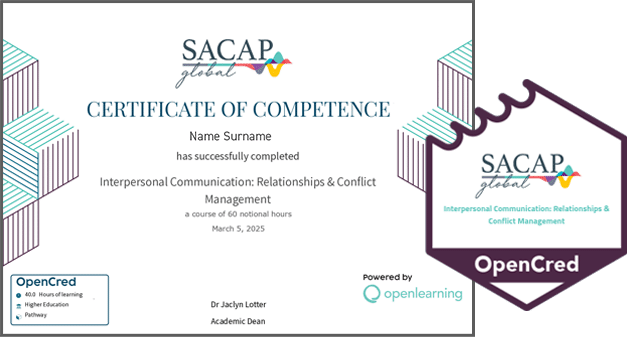Interpersonal Communication: Relationships & Conflict Management
R6,160.00

Course Overview
Communication shapes how we view the world, and it impacts our feelings, actions and engagement with others. Effective interpersonal communication is the foundation of strong relationships with friends, family members, or in the workplace.
The Interpersonal Communication micro-credential course will help you understand the role of emotions, communication styles, and power dynamics in everyday interactions.
The course explores key aspects of interpersonal communication, including conflict resolution, communication with persons with different abilities, and strategies for managing power dynamics.
In this 8-week course you will learn how to manage conflict positively and how to apply different approaches to various types of person-to-person dynamics in family, social and workplace settings.
By the end of this course, you will know how to analyze, adapt, and apply effective communication strategies across various social and professional contexts.
Whether you’re looking to improve personal relationships or enhance professional interactions, this course will equip you with valuable insights and practical tools so you can engage more meaningfully with others and navigate interpersonal communication with confidence.
FAQs
What are the entry requirements?
Anyone 18 years of age or older can sign up for this micro-credential course. There are no academic entry requirements or conditions.
Who is this course for?
This course is for anyone interested in strengthening their communication skills and have meaningful engagements with friends, family and colleagues.
What is the time commitment?
A total of 80 hours is required to complete the micro-credential course. An average of 10 hours weekly over 8 weeks.
What do you need to do the course?
- Access to Microsoft Word
- Google Chrome (recommended)
- Stable internet connection
Is this course accredited?
The micro-credential course is not accredited and non-credit bearing.
What is interpersonal communication?
Interpersonal communication is the exchange of information and emotions through verbal, nonverbal, written, and listening interactions. Read more here.
Course highlights

-
Deepen your people skills.
-
Become an expert at expressing yourself and connecting with others.
-
Cover advanced communication and conflict dynamics.
Dates
Class of 2025 October: 6 October – 30 November
There are no online classes. Course content is released on a weekly basis allowing you to work through course material, and meet weekly targets, at a time that is most convenient to you.
Learner Experience
Certification
Upon completion, you will receive a digital certificate of competence and badge. Your certificate and badge can be shared on 100+ social media platforms, allowing you to share your achievement with a single click.

Credential Type
Learners study online with peers and receive robust academic content while acquiring practical industry-relevant skills.
The OpenLearning team has reviewed this course to ensure quality academic learning within the Malaysian and Australian credentialing framework.
An OpenLearning OpenCred is a type of credential that can stand-alone or interact with a formal qualification. OpenCred courses are market-leading online courses that prepare learners for the future of work.
This course has been designed and developed by experts in the field of psychology. The Interpersonal Communication: Relationships & Conflict Management micro-credential is for anyone needing to upskill in this area and offers 40 hours of learning and assessment.
OpenCreds
Completing this course leads to obtaining an OpenCred.
- 40 hours of learning
- OpenCred classification: Pathway
Stackable Credentials
Stack specified combinations of micro-credentials and they can be recognised as equivalent to a module within the Bachelor of Applied Social Science Degree at SACAP. Effective Interpersonal Communication can be stacked with Interpersonal Communication: Relationships & Conflict Management, and if you meet the minimum entrance criteria, you can enrol for the Bachelor of Applied Social Science Degree and apply for module exemption.

What You’ll Learn
Over the course of eight (8) weeks, through videos, readings and various learning activities, you will explore the following topics:
Week 1: The influence of human emotions in interpersonal communication
Week 2: Interpersonal communication styles: Friendships and professional relationships
Week 3: Interpersonal communication styles: Marriage and family
Week 4: Interpersonal communication dynamics of conflict
Week 5: Interpersonal communication strategies for managing conflict
Week 6: Power dynamics and their effects in interpersonal communication
Week 7: Interpersonal communication with persons with different abilities
Week 8: Summative assessment
Course Outcomes
By the end of this course, you will have:
- Described the influence of human emotions in interpersonal communication.
- Analysed styles of interpersonal communication that typically function within friendships and professional relationships.
- Analysed styles of interpersonal communication that typically function within marriage and family contexts.
- Examined the dynamics of interpersonal conflict.
- Applied effective communication strategies for managing interpersonal conflict.
- Described the role that power and influence play in interpersonal communication and relationships.
- Applied effective communication strategies for persons with different abilities.
The Team
The SACAP Global team brings a wealth of knowledge and practical experience across various disciplines. Our expert short course developers and dedicated support team are passionate about sharing their insights to help you get the most out of your online learning journey.






















